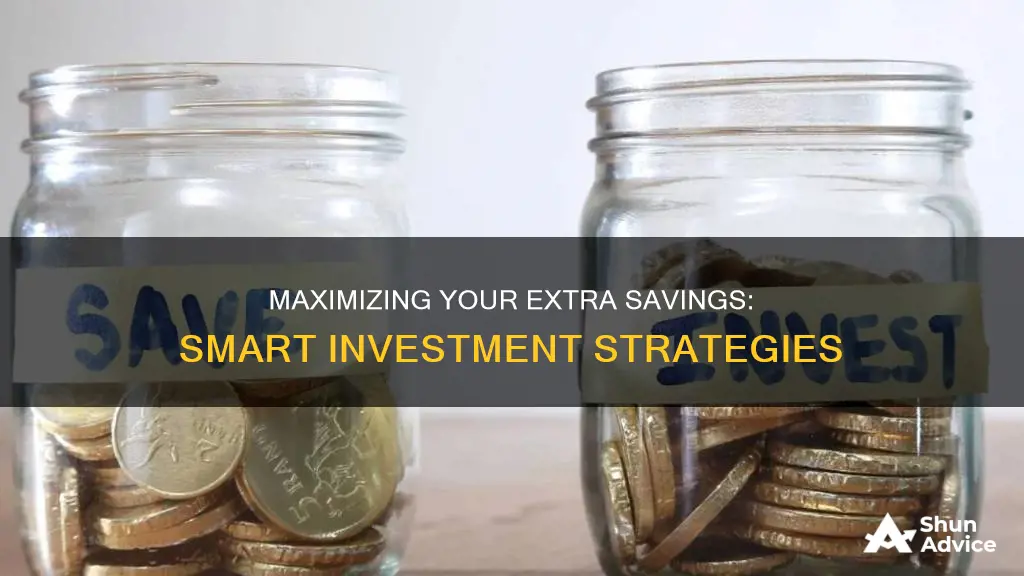
If you have extra savings and are wondering where to invest them, there are several options to consider. Firstly, it is recommended to have an emergency fund that can cover three to six months' worth of household expenses. This can be kept in a high-yield savings account, which provides easy access to funds and earns a higher interest rate than a traditional savings account. Another option is to invest in stocks, either directly or through an index fund, which can provide higher returns but carries more risk. For those with higher risk tolerance, investing in real estate or gold can be an option. Additionally, consider increasing contributions to retirement accounts such as a 401(k) or IRA, paying off high-interest debt, or investing in yourself by funding your education or starting a business.
| Characteristics | Values |
|---|---|
| Accessibility | High liquidity, easy access to money |
| Risk | Low risk, FDIC-insured |
| Returns | Interest rates vary, higher interest for high-yield savings accounts |
| Purpose | Emergency fund, retirement, debt repayment, investment, education, business, etc. |
| Type | Savings account, brokerage account, 401(k), IRA, money market account, etc. |
What You'll Learn

High-yield savings accounts
When choosing a high-yield savings account, look for accounts that have high interest rates and low service charges. You want to make sure you don’t have to pay a fee each month. Some institutions don’t charge monthly fees, while others do but will waive them if you meet a balance minimum. Be willing to look beyond the larger, well-known banks. Many smaller institutions—including online banks and apps—feature good rates and low deposit requirements.
- Barclays Tiered Savings Account
- SoFi Checking and Savings
- CIT Bank Platinum Savings
- American Express High Yield Savings Account
- Forbright Bank Growth Savings
- EverBank Performance Savings
- Capital One 360 Performance Savings
- UFB Portfolio Savings
Savings or Investments: The Best Way to Utilize Your 100K
You may want to see also

Certificates of Deposit (CDs)
CDs are a safer and more conservative investment option than stocks and bonds, but they offer a lower opportunity for growth. They are ideal for those who want to earn more than most savings, checking, or money market accounts without taking on more risk. CDs are also a good option if you want some of your savings invested conservatively, as they can help you achieve lower risk and volatility than investing in the stock and bond markets.
When opening a CD, you will need to consider the interest rate, term, principal, and financial institution. The interest rate is usually fixed, but there are variable-rate CDs that could earn a higher return if rates rise. The term is the length of time that you agree to leave your funds deposited, typically ranging from three months to ten years. The principal is the amount that you agree to deposit when you open the CD, with a minimum deposit set by the bank or credit union.
One downside of CDs is that your money is locked into the investment, and if you withdraw the funds early, you will be charged a penalty. Additionally, CDs typically earn less than stocks and bonds over time, and a fixed rate could cost you if interest rates rise during the term. Inflation can also eat away at the value of money locked in at a fixed rate.
To maximize your returns, you can create a CD ladder, which involves investing in multiple CDs with different maturity dates. This provides flexibility and less risk than putting all of your money into a single CD. When choosing a CD, consider the length of time you want to keep your money locked up, the interest rate, minimum deposit requirements, and early withdrawal penalties.
Savings and Investments: Two Sides of the Same Coin
You may want to see also

Money market funds
- Government MMFs: These invest at least 99.5% of their assets in cash, government securities, or repurchase agreements that are collateralized by government securities.
- Short-term credit (Prime) MMFs: These can invest in government securities and securities issued by banks, corporations, and other non-government entities.
- Municipal MMFs: These buy municipal bonds and other debt securities, and are exempt from federal and sometimes state income tax.
- Standard MMFs: These have a minimum investment horizon of three months and offer the opportunity for higher yields by holding less liquidity and slightly lower credit quality.
Private Investment: When Planning Exceeds Saving
You may want to see also

Treasury bills
T-bills are sold at a discount from their face value and mature at face value. The difference between the purchase price and the maturity value is the interest earned by the investor. For example, if you buy a $1,000 T-bill at a discounted price of $950, you will earn $50 in interest when the bill matures.
T-bills are usually sold in denominations of $100, with a minimum investment requirement of $100, and can be purchased directly from the US Treasury through the TreasuryDirect website. They are also available for purchase on the secondary market through a broker or investment bank.
T-bills are highly liquid investments, meaning they can be easily bought or sold in the secondary market before their maturity. They are actively traded on the open market, making them a flexible investment option.
While T-bills are considered a safe investment, they are not completely risk-free. One of the main risks is the opportunity cost of investing in T-bills, as they offer very low returns compared to other investments. Additionally, T-bills are subject to inflation and interest rate risks, which can erode the value of your investment.
T-bills can be a good option for investors looking for a safe and secure investment with a short-term maturity while parking their money for a short period. They are also suitable for those seeking to diversify their portfolio with low-risk investments.
Savings Glut: When Saving Outpaces Investment
You may want to see also

Stocks
If you're looking to invest in individual stocks, you can research companies you're excited about and believe will perform well in the future. It's important to keep in mind that investing in stocks comes with a higher degree of risk than more diversified investments like mutual funds.
Before investing in stocks or any other type of investment, it's crucial to ensure you have an emergency fund in place and that you're free of high-interest debt. It's also a good idea to consult with a financial advisor to determine the best investment strategies for your specific situation.
Additionally, when investing in stocks, it's important to have a long-term perspective and focus on "time in the market" rather than trying to "time the market." This means that instead of trying to predict the best time to buy or sell stocks, it's generally more effective to remain invested for the long term, as the stock market tends to trend upward over time despite short-term fluctuations.
Overall, investing in stocks can be a viable option for those looking to grow their savings and are comfortable with taking on higher risk.
529 Savings Plans: Smart Investment Strategies, per Forbes
You may want to see also
Frequently asked questions
If you're looking to make a quick profit, consider investing your extra savings in the stock market. While there are risks involved, historically the stock market has returned about 10% annually.
Low-risk options for investing your extra savings include high-yield savings accounts, certificates of deposit (CDs), money market accounts, and treasury bills. These options typically provide a lower return compared to higher-risk investments but offer more security and liquidity.
Yes, using extra savings to pay off high-interest debt, such as credit card debt, personal loans, or student loans, is generally a good idea. This can help you save money in the long run by reducing the overall interest you pay.
Absolutely! Investing in yourself is one of the best investments you can make. This could include saving for your education or that of a family member through a 529 plan or pursuing entrepreneurial dreams by starting or growing your own business.
It is generally recommended to keep between three and six months' worth of fixed expenses in a high-yield savings account as an emergency fund. This will provide a financial cushion in case of unexpected events, such as job loss or medical expenses.







